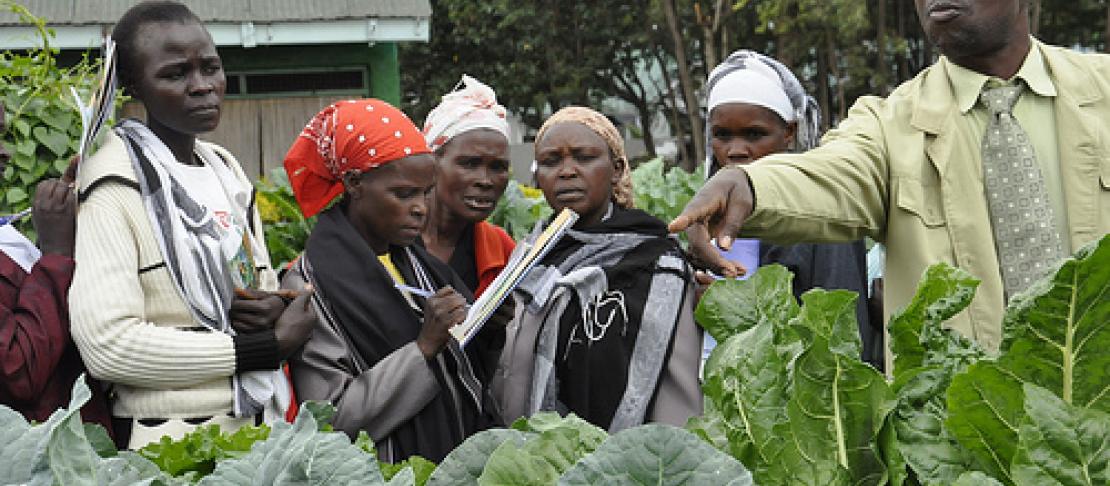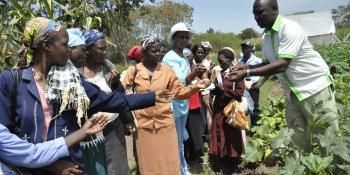Learning From Climate Change Adaptation Experiences of Communities and Government Departments at the County Level

The Learning Route, “Learning from climate change adaptation innovative experiences of communities and local governments in ASALs”, aims to faciliate learning by national decision makers in Kenya, Ethiopia, Tanzania and Uganda from community and local level experiences in ongoing climate change adaptation planning and action in arid and semi-arid lands in Kenya. Researchers from national research systems will join in.
Climate change and variability is already increasing temperatures and extreme weather events. In the future, it is projected to bring a rise in crop failures, pest and disease outbreaks and the degradation of land and water resources. These impacts are likely to hit arid and semi-arid regions in Africa especially hard. Consequently, the need to develop effective adaptation strategies has become crucial to securing livelihoods and community development. Several countries in East Africa have climate change response strategies in place and are working on National Adaptation Plans. A critical element to ensure effectiveness is to learn directly from the grass roots.
In light of these needs, the CGIAR Research Program on Climate Change, Agriculture and Food Security (CCAFS) in East Africa and the Adaptation Learning Programme in Africa (ALP) implemented by CARE International are working with the PROCASUR Corporation to develop a Policy Makers Learning Route.
The proposed Learning Route, “Learning from climate change adaptation innovative experiences of communities and local governments in ASALs”, aims for national decision makers in Kenya, Ethiopia, Tanzania and Uganda to learn from community and local level experiences in ongoing climate change adaptation planning and action in arid and semi-arid lands in Kenya. To enhance the learning experience, policy makers will be joined by researchers drawn from national research systems. Through their exposure to local realities, collaborative learning from practical examples, technologies and case studies of climate change adaptation measures and comparative analysis, it is anticipated that participants will be better placed to roll out national adaptation and development policies and plans which are relevant and effective in arid and semi-arid lands (ASALs).
Participants will listen to the communities observe, discuss, debate, share experiences, and ask questions about climate change adaptation to gain a better understanding of adaptation challenges, capacities, needs and opportunities, which should be supported through national policy and plans.
The learning route participants will visit Garba Tulla, Isiolo, where they will meet local communities working with the Resource Advocacy Programme (RAP) initiative and community and local participants from Garissa (ALP initiative). They will then visit communities working with CCAFS in Wote, Makueni, who are already engaged in adaptation planning and actions. All are ASALs in Kenya.
The visit to the CCAFS site in Wote, Makueni, will expose the policy makers to some of the ongoing adaptation practices being tested by farmers, development practitioners and research institutions in the area. Guided by the CCAFS themes, the policy makers and researchers will attempt to answer the following questions during the site visit:
1. How can farming communities (crop and livestock) in ASAL regions adapt to climate change to ensure food security?
2. What are the benefits of on-farm soil and water conservation?
3. How can early warning systems and climate forecasts be used in rural communities and how can we enable farmers to access information?
4. What policy interventions exist or need to be developed to enable climate change adaptation in the agricultural and livestock sectors in ASALs?
There will be an opportunity for virtual participation through PROCASUR Virtual Learning Community created on PROCASUR´s website and Facebook account. We will share the link once it becomes available.
See related documents: Unlocking the potential of social learning for climate change and food security
From our blogs:
Read more on Climate Change and Social Learning
Farmers and scientists: Better in the fight against climate change


